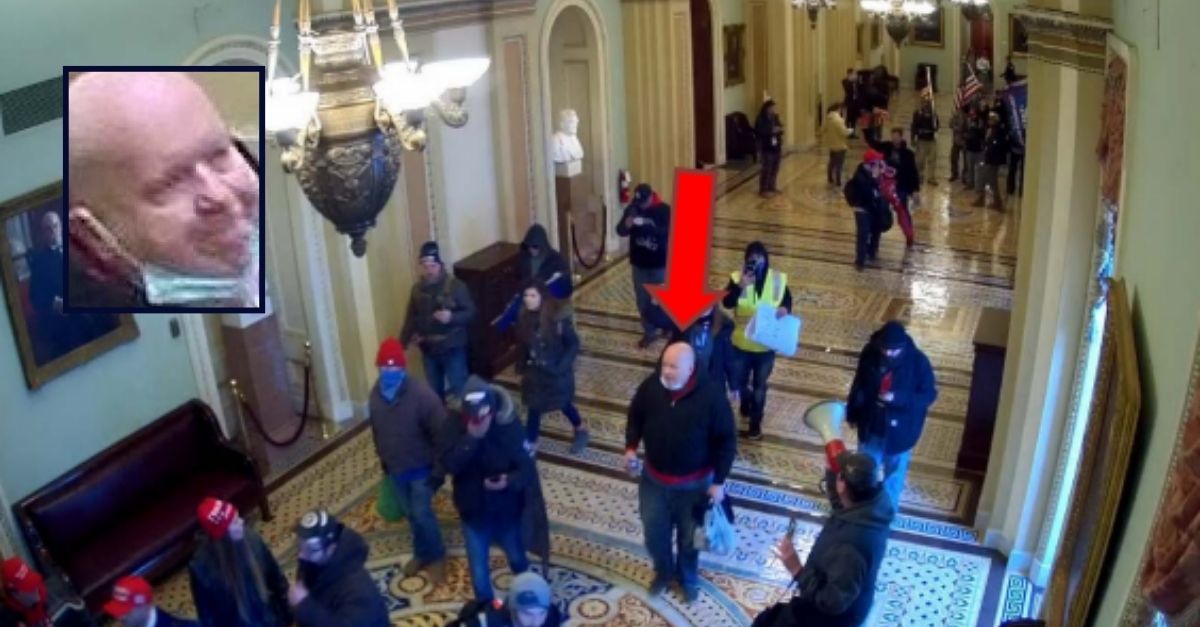Jan. 6 rioter loses appeal over double jeopardy claim


James Little (inset, below red arrow) during Jan. 6 (DOJ).
A Jan. 6 rioter lost his court battle after he claimed a judge violated double jeopardy when he sentenced him to more prison time after he won an appeal that threw out his original sentence.
Senior U.S. District Judge Royce Lamberth sentenced James Little to 60 days in jail and three months probation in a so-called “split sentence” after the defendant pleaded guilty to a misdemeanor disorderly conduct charge. Little appealed, claiming the charge for which he was convicted did not allow for a split sentence. The U.S. Circuit Court for the District of Columbia ruled in his favor in August 2023.
Lamberth, a Ronald Reagan appointee, subsequently resentenced Little to 150 days imprisonment with credit for time served. Little appealed that sentence, claiming Lamberth had violated the Double Jeopardy Clause that states a person cannot be punished twice for the same crime. But the DC Circuit rejected Little’s argument, saying he was not punished twice but merely resentenced after the original sentence was thrown out.
“Little argues that his new sentence violates the Double Jeopardy Clause because the district court imposed additional punishment after Little had already completed the term of incarceration that was part of his illegal split sentence,” Joe Biden appointee U.S. Circuit Judge Florence Pan wrote. “He also contends that he had a legitimate expectation of finality in his original sentence. Both of Little’s arguments are unpersuasive.”
Double Jeopardy does not apply when a person is being resentenced, the court ruled.
“The court may even ‘impose upon reconviction a longer prison sentence than the defendant originally received,’ so long as the years already spent in prison are ‘returned’ to the defendant ‘by subtracting them from whatever new sentence is imposed,’” Pan wrote.
Little’s lawyers argued that he couldn’t be punished again because he had already served out his original 60-day jail sentence and was 30 days into the three-month probation term when the appeals court ruling came down. The court called Little’s arguments “unconvincing.”
As Law&Crime previously reported, Lamberth at Little’s resentencing hearing decried the soft-pedaling of the violent actions of the Jan. 6 mob, when thousands of Donald Trump supporters overwhelmed police and broke into the Capitol building as Congress had begun to certify President Joe Biden’s 2020 presidential win. The breach forced lawmakers to either flee the building or shelter in place for hours. Lamberth said that referring to the violence as little more than a harmless political demonstration — when it was actually a deadly, costly riot that temporarily brought the peaceful transfer of presidential power to a temporary halt — is both baffling and dangerous.
Lamberth said Little’s apparent lack of remorse played a significant role in his decision — a trend that the judge noted goes beyond the defendant himself.
“The Court is accustomed to defendants who refuse to accept that they did anything wrong,” Lamberth said, according to notes filed on the public docket. “But in my thirty-seven years on the bench, I cannot recall a time when such meritless justifications of criminal activity have gone mainstream.”
Lamberth continued:
I have been dismayed to see distortions and outright falsehoods seep into the public consciousness. I have been shocked to watch some public figures try to rewrite history, claiming rioters behaved “in an orderly fashion” like ordinary tourists, or martyrizing convicted January 6 defendants as “political prisoners” or even, incredibly, “hostages.” That is all preposterous. But the Court fears that such destructive, misguided rhetoric could presage further danger to our country.
Lamberth said that as he “cannot condone the shameless attempts by Mr. Little or anyone else to misinterpret or misrepresent what happened,” it falls to him to “set the record straight.”
“On January 6, 2021, a mob of people invaded and occupied the United States Capitol, using force to interrupt the peaceful transfer of power mandated by the Constitution and our republican heritage,” he said.
Marisa Sarnoff contributed to this report








